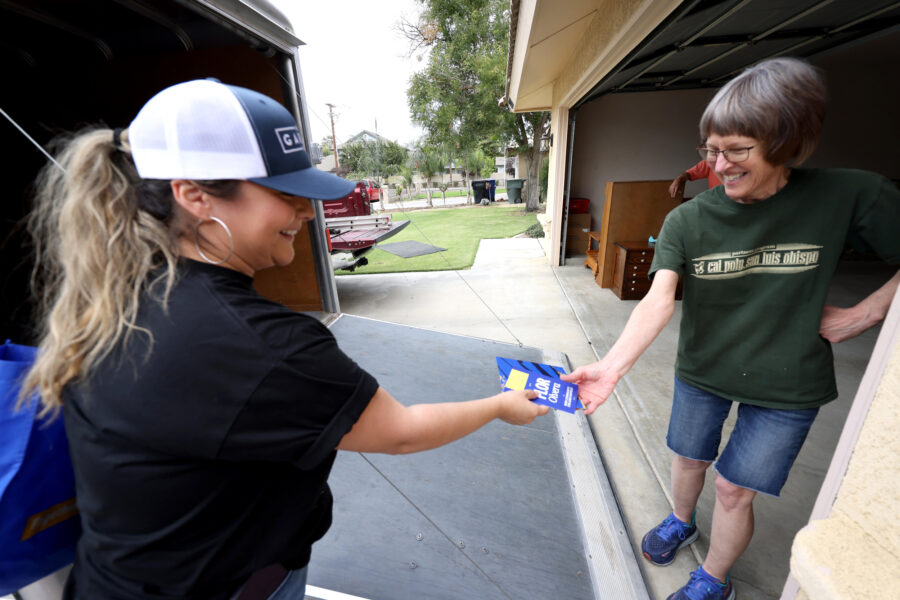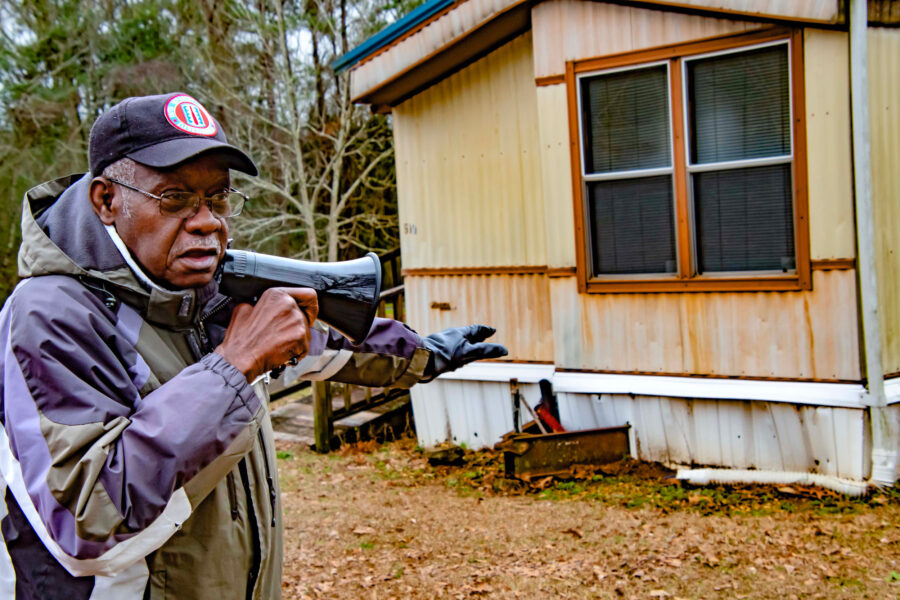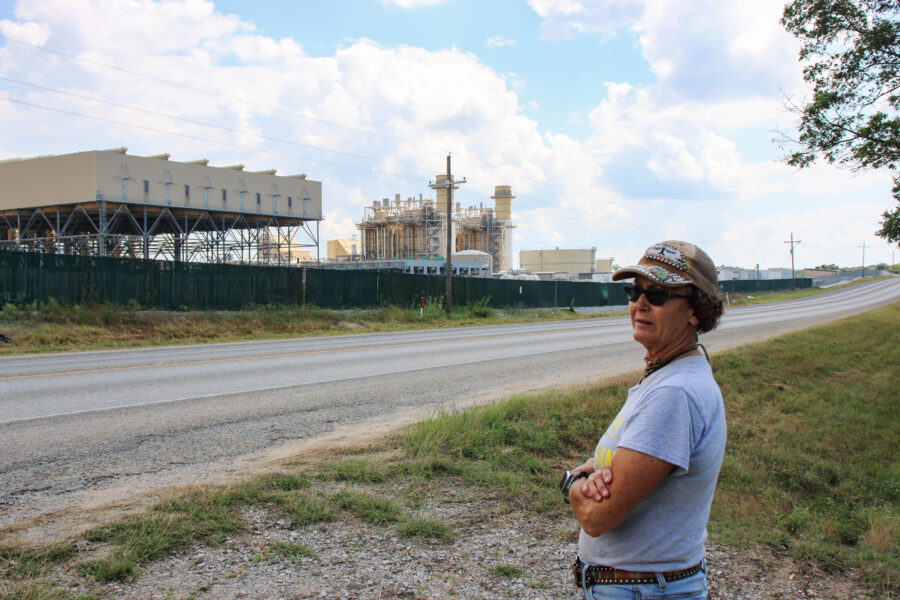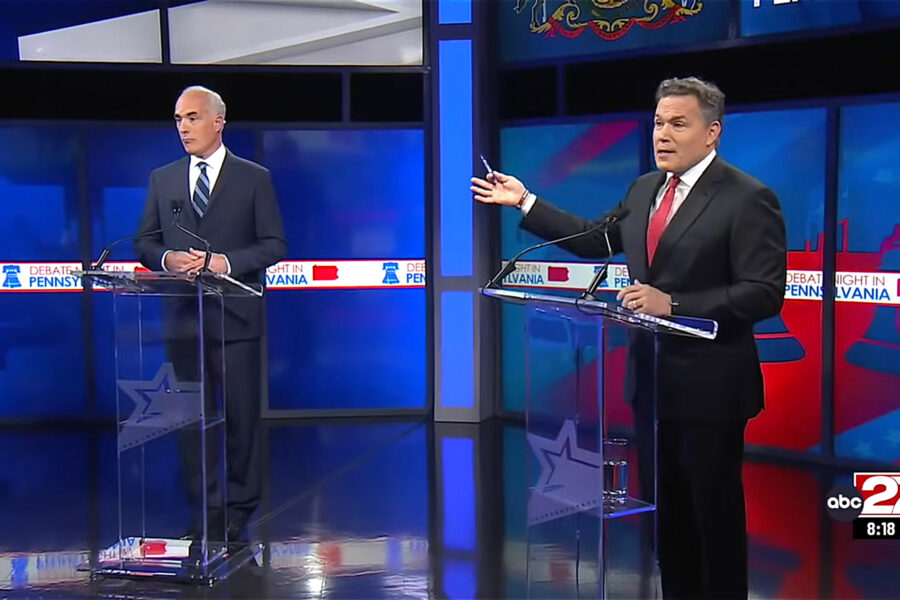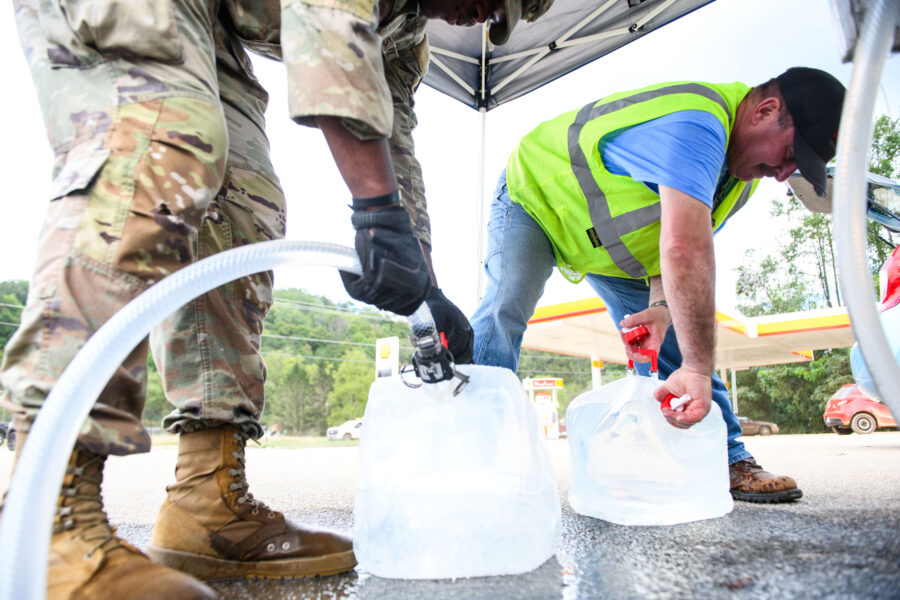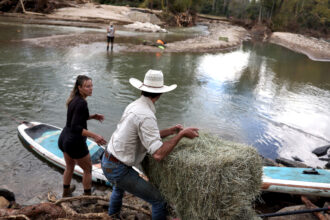Federal Highway Officials Reach Agreement With Alabama Over Claims It Discriminated Against Flooded Black Residents
SHILOH COMMUNITY, Ala.—The Federal Highway Administration has reached a voluntary resolution agreement with the Alabama Department of Transportation over claims that it discriminated against residents through a highway expansion project that led to repeated flooding of a historically Black community.
The agreement, published Friday, outlines two “improvement” plans that federal officials say could help mitigate the flooding problems facing residents. The agreement states that Alabama officials are to proceed with one of two similar plans, both of which require construction of additional drainage infrastructure onsite.
One of the plans, which federal transportation officials noted as preferred, also involves the purchase of additional right-of-way property from Shiloh residents to build added drainage.
Federal investigators did not reach any conclusion about whether state transportation officials engaged in racial discrimination in the Shiloh community, about 70 miles south of Montgomery—a decision at least one resident has already criticized. Instead, officials wrote that they would forgo additional inquiry into those claims if the state would agree to the mitigation plans outlined in the agreement.
Explore the latest news about what’s at stake for the climate during this election season.
The Biden administration initiated an investigation in 2022 under Title VI of the Civil Rights Act, which prohibits racial and other discrimination in programs receiving federal funding. The move came after Black Shiloh residents filed a complaint before the Federal Highway Administration (FHWA), alleging that the elevation of U.S. Highway 84 by ALDOT, the state transportation agency, had flooded their homes.
“ALDOT disputes that a Title VI violation has occurred,” the agreement states. “In entering into this Agreement, FHWA is not making a noncompliance finding against ALDOT, and ALDOT is not admitting a violation of Title VI. ALDOT has agreed to implement the actions described in this Agreement voluntarily.”
The agreement does not address the state’s use of restrictive covenants in Shiloh—legal instruments that Inside Climate News found in an investigation were limiting Black residents’ ability to sue for compensation over continued flooding.
Shiloh residents had filed complaints with both federal transportation and environmental officials, claiming that the state continued to ignore legitimate complaints about constant inundation from rainwater flowing off Highway 84.
Federal officials later confirmed they were launching an investigation into “whether the Alabama Department of Transportation and Coffee County violated Title VI [of the Civil Rights Act] by not resolving the flooding issues impacting the community residing between US Highway 84 and County Road 502.”
The situation in Shiloh, elevated by local leaders like Pastor Timothy Williams and environmental advocates like Robert Bullard, a member of the White House Environmental Justice Advisory Council, also caught the attention of Transportation Secretary Pete Buttigieg, who visited Shiloh to tour the impacted community earlier this year.

During that visit, Buttigieg refused to answer questions about the Title VI investigation into ALDOT but repeatedly spoke of the importance of correcting past transportation wrongs, particularly in relation to race. He told residents he was moved by what he saw in the community.
Minutes earlier, he’d heard from residents like Willie Horstead Jr., an Army veteran who has spent years watching as his mobile home has slowly sunk into the soggy ground because of repeated flooding. Horstead and Williams filed the original complaint before the Federal Highway Administration.
“All where we’re standing right now, there is nothing but water here when there’s a good rain,” Horstead told Buttigieg. “I’ll tell you—I just want to be made whole.”
“There is no way I’m going to forget what I just heard,” Buttigieg said at the conclusion of his Shiloh visit.
The issues facing Shiloh were being worked on “at the highest levels of our department,” the secretary told community members. “That can involve both tools to ensure state officials “treat people well” and tools that allow federal officials to channel funds directly to communities, he told residents.
In a statement issued Friday, Buttigieg said the government will continue to work in residents’ interest.
“Earlier this year, I visited Shiloh to meet residents whose families had owned land there since slavery was outlawed, and I saw firsthand the flooding and home damage they have endured for years,” Buttigieg said. “The agreement with the Alabama Department of Transportation to build a drainage project is a first step toward addressing broader needs of the community. In addition to monitoring the state’s progress on project construction, the U.S. Department of Transportation will continue to provide technical assistance, coordinate with our federal partners, and urge Congress as well as state and local governments to act to unlock further resources to help make the Shiloh community whole.”
In the months since the visit, some residents have said they felt neglected by federal officials, waiting on help that had been promised but that hadn’t yet made a difference for those on the ground in the small community.
The voluntary agreement is the first public federal action taken since Buttigieg’s visit.
The agreement’s first, preferred plan would involve the purchase of right-of-way properties from Shiloh residents for “reasonable” prices in order to relocate a discharge point and construct a drainage ditch to move water toward a natural outfall point south of the community. The plan would also involve regrading a detention basin to increase pond capacity and installing an emergency spillway to direct more water into roadside ditches, which will be expanded.
The second plan, only to be implemented if the first plan is deemed unfeasible, would involve adding a detention basin in the median of the highway with two riser structures “to further reduce the flow of water across the median … while providing adequate controls to avoid roadway flooding.” Residents in Shiloh have long noted that neither the highway nor their properties flooded before the expansion, completed in 2019.
Williams told Inside Climate News he believes the agreement will eventually lead to improvements on the ground for the residents of Shiloh. On the issue of race, though, he said the voluntary agreement falls short.
Since the highway expansion occurred, residents and environmental advocates have emphasized the role race has played in the ongoing flooding of Shiloh.
Bullard, who has long studied the role of race in environmental injustice, has said that it couldn’t be clearer that Alabama was discriminating against its flooded Black residents in Shiloh, a community located not far from where he grew up. He has called the impact of the highway expansion the result of “savage” engineering.
“This road was engineered in a disrespectful way,” Bullard said in February. “There are no other communities along this stretch of highway that were put in a bowl. The only thing that is different about this community is that they’re Black landowners. … This was done on purpose by smart people who are engineers and hydrologists and who do not care about the results and do not care about fixing it. Structural racism created this problem. This is a manmade problem that did not have to exist.”

Williams said those were the dynamics in Shiloh left out of the text of the background findings outlined in Friday’s voluntary agreement. The agreement should also have addressed what he believes was a racist use of restrictive covenants to limit the state’s liability as well, he said.
“All of that should’ve been included,” Williams said.
In a statement, a representative for ALDOT said the agency is “pleased” with the agreement.
“Early on, ALDOT showed its commitment by hiring an engineering firm to study the issues and look at options,” the agency spokesperson said. “We are encouraged that the FHWA recognizes ALDOT’s commitment to resolving the concerns expressed by the Shiloh Community. We look forward to working with our federal partner to implement the planned improvements.”
According to the agreement, ALDOT will be required to submit progress reports outlining the extent of improvement work in Shiloh every 180 days and endeavor “to ensure that the affected property owners are informed” during the mitigation process.
Sarah Stokes, a senior attorney for the Southern Environmental Law Center representing residents, echoed Williams in saying that the agreement is only one part of making those impacted feel whole.
“This is only a piece of the solution residents are fighting for, so our work supporting them is not finished,” she said. “The government should also make them whole as a basic step towards dignity and justice.”
About This Story
Perhaps you noticed: This story, like all the news we publish, is free to read. That’s because Inside Climate News is a 501c3 nonprofit organization. We do not charge a subscription fee, lock our news behind a paywall, or clutter our website with ads. We make our news on climate and the environment freely available to you and anyone who wants it.
That’s not all. We also share our news for free with scores of other media organizations around the country. Many of them can’t afford to do environmental journalism of their own. We’ve built bureaus from coast to coast to report local stories, collaborate with local newsrooms and co-publish articles so that this vital work is shared as widely as possible.
Two of us launched ICN in 2007. Six years later we earned a Pulitzer Prize for National Reporting, and now we run the oldest and largest dedicated climate newsroom in the nation. We tell the story in all its complexity. We hold polluters accountable. We expose environmental injustice. We debunk misinformation. We scrutinize solutions and inspire action.
Donations from readers like you fund every aspect of what we do. If you don’t already, will you support our ongoing work, our reporting on the biggest crisis facing our planet, and help us reach even more readers in more places?
Please take a moment to make a tax-deductible donation. Every one of them makes a difference.
Thank you,
David Sassoon
Founder and Publisher
Vernon Loeb
Executive Editor
Share this article
- Republish
Disclaimer: The copyright of this article belongs to the original author. Reposting this article is solely for the purpose of information dissemination and does not constitute any investment advice. If there is any infringement, please contact us immediately. We will make corrections or deletions as necessary. Thank you.

